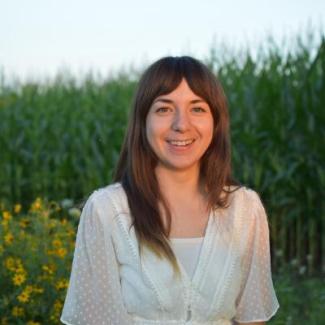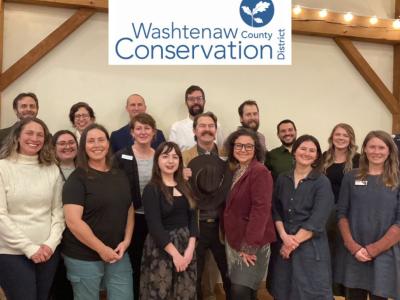
It’s a muddy day on the farm, and the bark of a dog echoes as you step out of the truck, boots sinking into the soft ground. It's a far cry from the office, but this is where the work happens — on the land, with real problems to solve. For Kristen, a technician with the Washtenaw County Conservation District, this is all in a day's work. Whether it’s helping landowners plan conservation practices or guiding them through the maze of funding options, she’s there to make sure farmers have the resources they need to tackle issues like soil erosion and water quality.
Kristen works with landowners to plan and implement conservation practices while also helping them navigate the often complex process of securing funding. Her focus is on securing federal Farm Bill cost-share funding through programs like EQIP and CSP, but her collaboration with both the Washtenaw County Conservation District (WCCD) and the USDA’s Natural Resources Conservation Service (NRCS) means she’s well-versed in resources available at both local and federal levels. Conservation practices are all about managing natural resources to protect, improve, and sustain productivity, from preventing soil erosion to improving water quality and creating wildlife habitats. Some examples include planting cover crops, removing invasive species, and establishing pollinator habitats.
Securing cost-share at the federal level can be a complex process, Kristen explains. The application process begins with a site assessment to identify resource concerns and to decide on practices producers would like to implement to address those concerns. Applications are then ranked based on environmental impact and the landowner’s commitment to implementation, with funding awarded from a competitive pool. Throughout the entire process, NRCS staff offer crucial support to ensure landowners meet all requirements and deadlines.
Kristen advises landowners seeking cost-share for conservation to thoroughly research all available options, whether at the federal, state, or local level, as these opportunities often change with new programs opening or closing. Staying informed and maintaining regular communication with local NRCS offices or conservation districts is key to making the most of these evolving opportunities. She also stresses that producers should pursue cost-share only for practices they are genuinely committed to, as these programs require the landowner to contribute a portion of the costs.
To learn more about available cost-share opportunities and how Kristen can guide you through the application process, reach out to her directly at kristen@washtenawcd.org. Whether you're interested in federal programs like EQIP and CSP or exploring state and local options, Kristen is ready to help you navigate these resources and implement effective conservation practices. She looks forward to working with you to achieve your conservation goals.
Local conservation districts play a critical role in protecting our land, water, and farms. Your support can help us continue this essential work during uncertain times. Please consider making a donation to keep conservation on the ground in our community.
